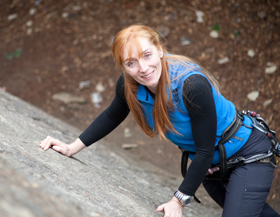
 Dr Shelagh Ferguson
Dr Shelagh Ferguson
Department of Marketing
Shelagh has the perfect background to study tourism and adventure marketing.
As a passionate outdoors person, she lives a life that complements her research, whether climbing, skiing or mountain biking.
In between gaining a Recreational Management BA and a Postgraduate Diploma and MA in marketing, she worked on ski fields as a ski-instructor and marketer in the UK.
She chose to come to New Zealand's South Island for the mountains, and the University of Otago for her academic career.
“It's a great place to study, with excellent resources and support from staff, and you can do innovative things,” — such as her PhD, which studied how consumers used commercial adventure experiences like bungy jumping to create the stories they told about themselves.
Since joining the Department of Marketing in 2002, Shelagh's research has included adventure tourism, consumer theory and culture, consumption communities within society and interpretive and ethnographic research methods.
She and her postgraduate students are still very much involved with the outdoors.
Recent research has investigated seasonal ski workers and brand culture. “Temporary ski field workers are generally poorly paid and poorly valued, but they have about 90 per cent of the contact with customers and are very influential in the experience that customers have at a ski destination.
“Ensuring that these seasonal workers feel part of the brand culture has been recognised in the literature, but we were the first to actually map it out and understand how these interactions work.”
Other topics include how consumers use adventure tourism to construct heroic identities, and the socialisation of female climbers.
“Climbing is usually seen as a predominantly masculine activity, so it's important for policy makers who plan for public participation to see how females fit in. Understanding the socialisation process from gendered perspectives has an impact upon participation.”
For Shelagh, the Department gives her and her students the flexibility to explore consumer research in the context of the outdoors and adventure.
“It's perfect to be part of a prestigious University and still be able to climb a 2000 metre peak at the weekend – there are not many places where you can do that.”